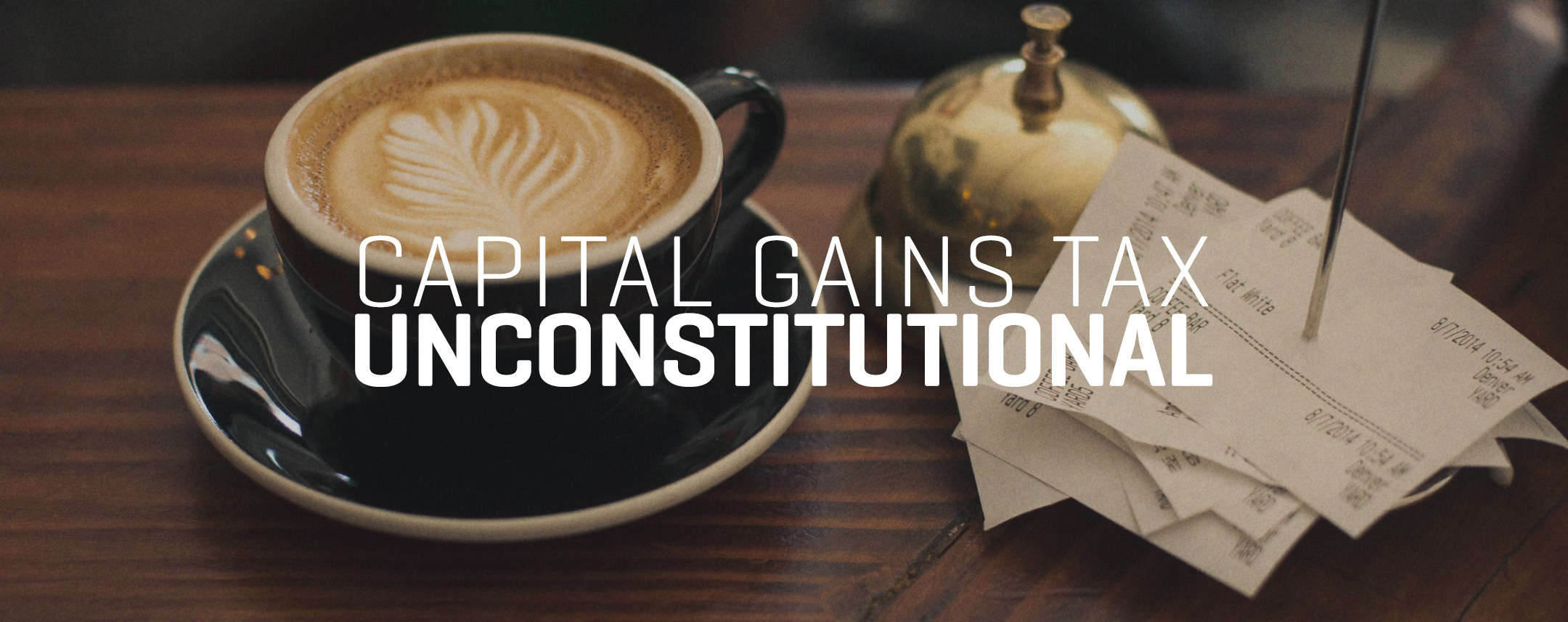Five years ago, Washington voters were asked to consider a state income tax
They did, and it was rejected decisively. But the fight for potential new sources of tax revenue is far from over.
A perennial favorite of the left is the option of a state capital gains tax, and it came uncomfortably close to passage this year. Gov. Jay Inslee, in particular, threw his weight behind a 7 percent capital gains tax early in the legislative session.
All of the various bills introducing the capital gains tax contain a progressive scheme, usually only imposing the tax on those who earn more than $25,000 in capital gains per year.
In addition to the political obstacles faced by any new tax, however, a capital gains tax would have to pass very significant constitutional and legal hurdles.
Are Capital Gains Income?
For tax purposes, income “from whatever source derived” is defined very broadly. At the federal level, capital gains are taxed as income. If they weren’t defined as income, some experts believe the federal government’s ability to tax them would be subject to constitutional challenge.
As the tax debate currently stands, no one has successfully tested the federal government’s exercise of its power to tax capital gains as income.
In Washington, Gov. Inslee and proponents of the capital gains tax are hoping to do just that—albeit unintentionally. The capital gains tax bill relies on language defining the capital gains tax as an excise tax “on the privilege of selling or exchanging long-term capital assets, or of receiving Washington capital gains,” rather than an income tax.
Proponents have attempted to compare the proposed capital gains tax to Washington’s real estate excise tax, but such a comparison easily breaks down. The real estate excise tax is paid whenever a property is sold, even when that property has declined in value.
By contrast, the proposed capital gains tax is only triggered if the property has created a “gain” for the seller above a specified exemption level.
The state recognizes this is tenuous legal ground. The fiscal note assumes “…up to five Superior Court actions will be filed challenging the constitutionality of the capital gains tax…”
That’s one assumption they can bank on.
Washington Supreme Court: Income is Property
If capital gains are income (as the federal government and other states have defined them), the likelihood of the tax prevailing under a state Supreme Court challenge is low. There are reasons Washington has no income tax, and they include more than just the political climate.
Though voters have rejected a personal income tax seven times, mostly recently in 2010, we would have had an income tax long ago if the state Supreme Court had not struck it down in 1933.
That ruling was based on Article VII, Section 1 of the Washington Constitution, which reads:
“All taxes shall be uniform upon the same class of property within the territorial limits of the authority levying the tax and shall be levied and collected for public purposes only. The word ‘property’ as used herein shall mean and include everything, whether tangible or intangible, subject to ownership.“
The court ruled, “(I)t would certainly defy the ingenuity of the most profound lexicographer to formulate a more comprehensive definition of ‘property.'” Culliton v. Chase, 174 Wash.363, 374 (1933).
It is this sweeping definition of property that creates trouble for capital gains tax proponents. If capital gains are income, and if income is property, then property is subject to uniform taxation (which rules out a progressive tax) and a 1 percent tax limit on the property’s true and fair value (also a constitutional provision).
Retired Washington State Supreme Court Justice Jim Johnson, senior legal fellow at the Freedom Foundation, believes this is the crux of the proposed tax’s constitutional problems.
“Because Washington law has long recognized that capital gains are income,” he said, “that income is property, and that property must be taxed equally, any lack of uniformity in an income tax scheme is unconstitutional.”
Johnson and his legal team at Freedom Foundation would be poised to defend taxpayers in the courts against Inslee’s unconstitutional tax — assuming one is adopted by the Legislature.
In 2010 an attempt was made to pass a graduated income tax in the form of Initiative 1098. At the time, tax advocates argued that Culliton and other state Supreme Court rulings on the definition of property were outdated, and that a modern income tax would not require a constitutional amendment.
This argument relied heavily upon a resurrected 1993 paper written by Seattle attorney Hugh Spitzer.
Since the tax failed, the question was moot, but for our purposes, the legal arguments around the state income tax are applicable to the proposed capital gains tax.
Spitzer’s argument was that the court “clearly misread” the earlier case upon which the Culliton decision was based, and that the court would likely use a “clean slate” approach when defining income, without the constraints of earlier cases.
Former Washington Supreme Court Justice Phil Talmadge disagreed.
“Washington law is unambiguous,” he wrote. “Income is property…(S)ince 1993, the Washington Supreme Court has been confronted with cases in which the continuing validity of the ‘income as property’ cases was questioned and has rejected the argument articulated in the Spitzer law review article.”
Obviously proponents of both Initiative 1098 and today’s proposed capital gains taxes acknowledge the likelihood that the court will continue to view income as property, or they would not have gone to the trouble of labeling them excise taxes.
This semantic maneuvering is an old trick originally employed by the Legislature in 1935, when lawmakers attempted to pass a graduated income tax by calling it an excise tax (deja vu, anyone?). The court ruled:
“…(T)he legislative body cannot change the real nature and purpose of an act by giving it a different title or by declaring its nature and purpose to be otherwise, any more than a man can transform his character by changing his attire or assuming a different name. The Legislature may declare its intended purpose in an act, but it is for the courts to declare the nature and effect of the act. The character of a tax is determined by its incidents, not by its name.” Jensen v. Henneford, 185 Wash. 209, 607 (1936).
The court didn’t buy the Legislature’s word games then, and it’s doubtful the justices’ collective intellect has decayed to the point they would buy them now.










